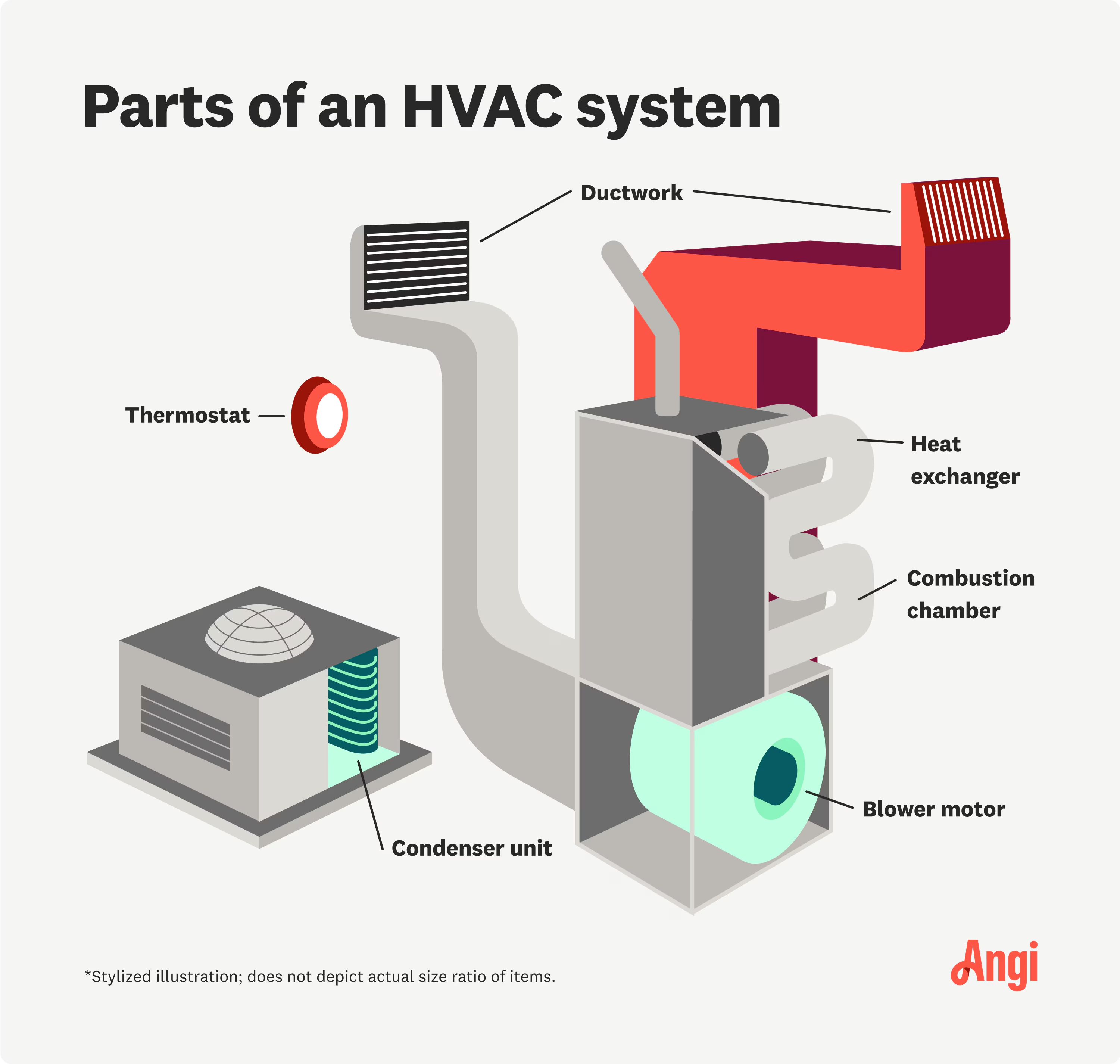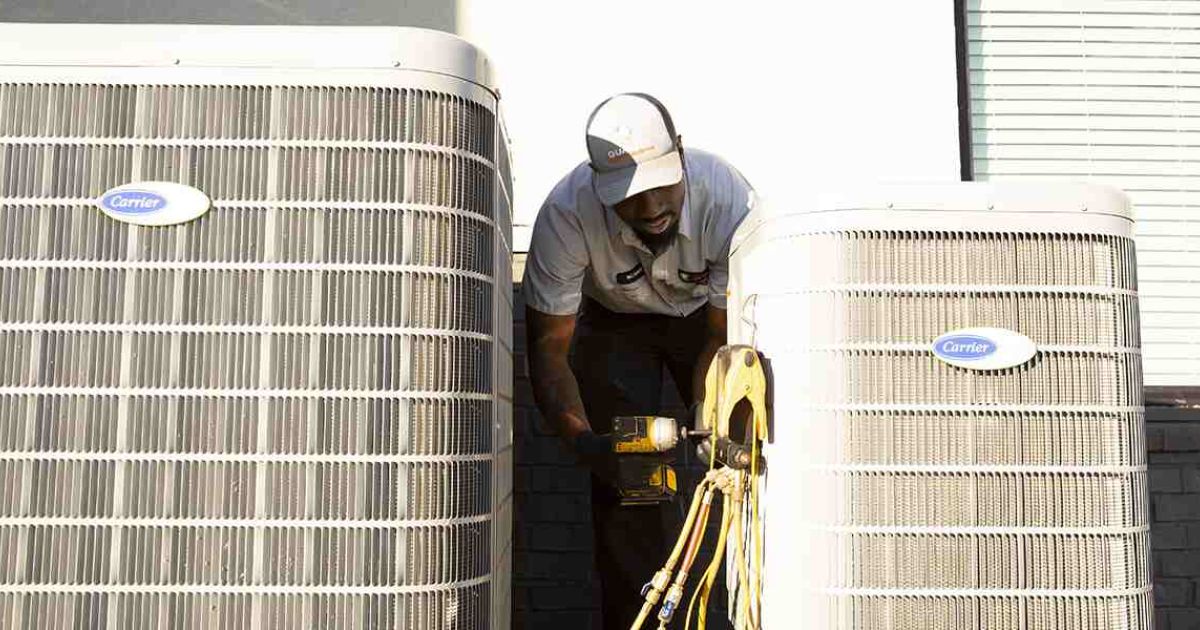Residential AC System Installation for Reliable Home Cooling
Residential AC System Installation for Reliable Home Cooling
Blog Article
An In-Depth Check Out Heating And Cooling Services and Their Effect on Power Effectiveness and Expense Financial Savings
With technical advancements like smart thermostats and high-efficiency elements, the capacity for enhancing system efficiency is substantial. As we explore the detailed relationship in between Cooling and heating systems and functional costs, including the change towards environmentally friendly choices, the question emerges: how can these approaches be effectively executed to maximize both economic and environmental advantages?

Value of A/c Systems
HVAC systems are a crucial component of contemporary structures, playing an important function in keeping comfortable and healthy indoor environments. These systems, encompassing air, ventilation, and heating conditioning, are necessary for managing temperature, moisture, and air quality, consequently making certain the health of owners. Effective HVAC systems add significantly to creating an optimal indoor environment, which is crucial for both residential and business areas.
In business structures, heating and cooling systems are essential to offering a safe and productive atmosphere. By controlling interior climate problems, these systems aid stop the growth of mold and the spread of airborne pollutants, hence safeguarding the wellness of staff members and customers. In addition, in residential settings, HVAC systems boost living conditions by supplying constant thermal comfort and boosting indoor air top quality, which is crucial for total health.
Moreover, the design and maintenance of HVAC systems have a direct influence on power consumption and operational expenses. Appropriately made and kept systems can considerably reduce power usage, leading to lowered utility bills and a smaller sized carbon impact. The performance of these systems thus plays a crucial function in advertising sustainability and energy preservation within buildings, highlighting their value in the contemporary building landscape.
Advancements in HVAC Technology
Technology in a/c technology is changing the means buildings take care of interior climates, introducing a new era of efficiency and control. Recent developments have focused on maximizing energy consumption while enhancing individual convenience. One remarkable development is the assimilation of smart thermostats, which utilize artificial knowledge to learn occupancy patterns and adjust temperature levels appropriately, lowering unneeded energy use.
Variable Refrigerant Circulation (VRF) systems represent another considerable jump onward. These systems enable specific temperature control in different zones of a structure, boosting comfort and decreasing power waste. VRF innovation is particularly beneficial for big business rooms, supplying adaptability and scalability.
Furthermore, the arrival of Internet of Things (IoT) devices has actually changed cooling and heating systems right into interconnected networks efficient in real-time information collection and evaluation. This connection makes it possible for anticipating maintenance, making sure systems run at peak performance and lessening unanticipated downtime.
Additionally, innovations in products and layout, such as making use of high-efficiency coils and compressors, have actually improved general system performance - Heating Contractor. The adoption of eco-friendly refrigerants additionally highlights the sector's dedication to sustainability
These technical innovations are pivotal in decreasing operational costs and environmental impact, setting brand-new requirements for building environment management.
Heating And Cooling Maintenance and Efficiency
Making sure ideal efficiency of HVAC systems prolongs past technological advancements; it also rests on effective maintenance methods. Routine upkeep is crucial for sustaining effectiveness, reducing energy consumption, and prolonging the lifetime of HVAC systems. The main objective is to make certain that all parts work at their peak potential, consequently reducing energy wastage and preserving regular indoor convenience degrees.
Regular upkeep jobs, such as cleaning or changing air filters, examining refrigerant levels, and inspecting ductwork for leaks, are necessary for stopping unneeded strain on the system. Unclean or clogged filters can obstruct air movement, triggering the system to function more difficult and consume even more power. Furthermore, why not try these out poor refrigerant levels can reduce cooling effectiveness, causing higher operational costs.
Additionally, routine assessments by certified specialists can identify possible issues prior to they escalate right into costly fixings or system failings. These examinations usually consist of checking electric links, adjusting thermostats, and making sure the overall integrity of the heating and cooling system. By attending to minor problems early, businesses and home owners can avoid unforeseen malfunctions and boost energy effectiveness.
Cost-Effective Heating And Cooling Solutions
For those aiming to get the most out of their heating, air, and ventilation conditioning systems without damaging the bank, exploring cost-effective a/c services can make a substantial distinction. One prompt procedure is to buy programmable thermostats, which enable customers to establish particular temperatures for different times of the day, optimizing energy usage and decreasing unneeded intake. By automating temperature changes, house owners can attain significant savings on energy expenses.
Normal maintenance is an additional vital component of affordable HVAC management. Making sure that filters are cleaned up or changed on a regular basis, ductwork is sealed, and units are serviced by experts can avoid costly repairs and boost system durability. Preventive upkeep not only maintains system efficiency however also aids in staying clear of unforeseen malfunctions that can result in pricey emergency situation repair services.
In addition, retrofitting existing systems with energy-efficient components, such as variable rate motors or high-efficiency compressors, can be a prudent financial investment. These upgrades improve functional efficiency, decrease power usage, and can typically be executed at a portion of the price of a complete system substitute.
Ecological Impact Reduction
Lowering the ecological effect of Heating and cooling systems is essential in today's quest of sustainable living. A/c systems are substantial contributors to energy intake, accounting for almost 40% of energy use in business structures.
Technical innovations in a/c style and procedure, including the combination of wise thermostats and energy-efficient warm pumps, are crucial in minimizing carbon impacts. These innovations enable optimized power use, minimizing wastefulness and enhancing general system performance. Additionally, embracing regular maintenance methods ensures heating and cooling systems run at peak efficiency, further stopping unneeded energy usage.
Moreover, using eco pleasant cooling agents heating ventilation and air conditioning is essential, as typical cooling investigate this site agents, like CFCs and HCFCs, have been terminated as a result of their ozone-depleting homes. Modern options, such as hydrofluoroolefins (HFOs), deal decreased environmental threats, lining up with international environmental protocols. By welcoming these lasting practices, HVAC services can play a transformative function in reducing environmental effects, advertising power effectiveness, and cultivating a much more lasting future.
Verdict

Moreover, the design and upkeep of A/c systems have a straight effect on power intake and operational expenses. Regular maintenance is critical for sustaining efficiency, minimizing energy intake, and expanding the life period of Cooling and heating systems. Heating and cooling systems are considerable factors to power consumption, accounting for virtually 40% of energy usage in commercial buildings. Additionally, adopting regular upkeep methods makes sure HVAC systems run at peak efficiency, additional cutting unnecessary energy intake.
The shift to eco friendly A/c systems better advertises and lowers operational expenses sustainability. (Heating Contractor)
Report this page